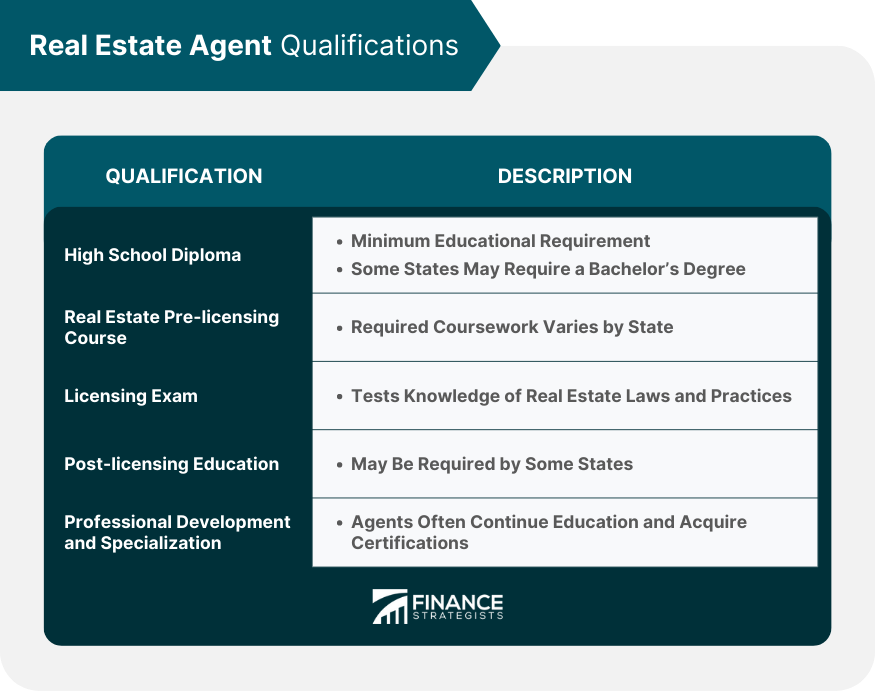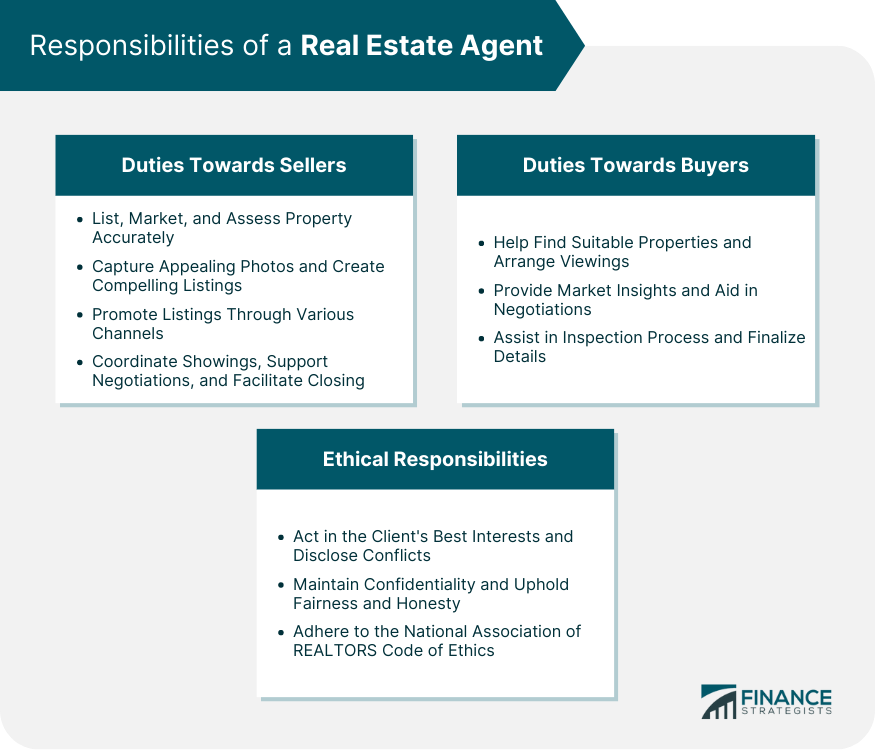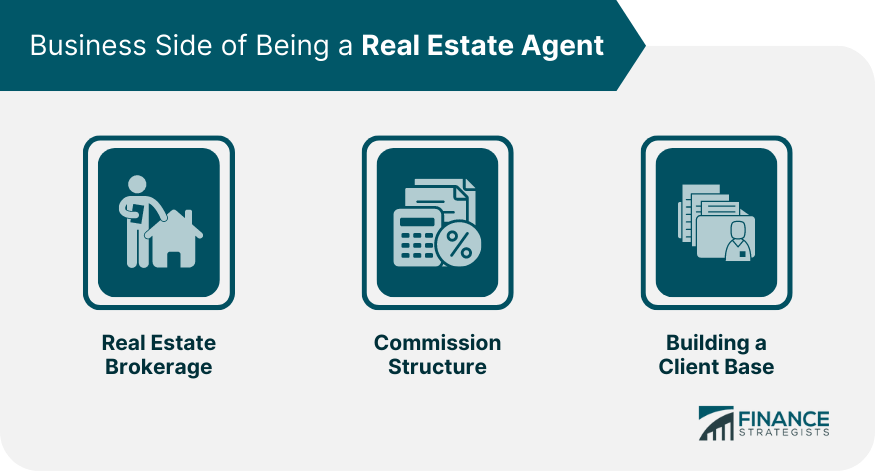Real estate agents are licensed professionals representing buyers and sellers in real estate transactions. They perform tasks such as presenting property listings to potential buyers, negotiating contracts, arranging for and overseeing inspections, and facilitating the closing process. Their expertise and knowledge of the property market are instrumental in ensuring a smooth transaction, whether they're representing a buyer or a seller. There are two types of real estate agents: sellers' and buyers' agents. Sellers' agents, also known as listing agents, represent the sellers' interests. On the other hand, buyers' agents advocate for the buyers. Additionally, some agents specialize in particular types of property, such as residential, commercial, or luxury real estate. Real estate agents play a pivotal role in property transactions. They provide market knowledge, negotiation skills, and administrative support to maintain clients' best interests. Their work is especially valuable considering the substantial financial investment involved in buying or selling property. A high school diploma is typically the minimum educational requirement for becoming a real estate agent. Some individuals may also choose to pursue a bachelor's degree in real estate, business, finance, or a related field. Prospective real estate agents must complete a pre-licensing course from an accredited real estate licensing school. Coursework varies by state but generally includes topics like real estate law, property management, and basic real estate principles. After completing the required education, candidates must pass a state licensing exam. The exam tests knowledge of real estate laws and practices, both at the state and national levels. Newly licensed real estate agents must work under the umbrella of a licensed real estate broker. Brokerages provide agents with the necessary operational and marketing support, helping them navigate their first transactions. Depending on the state, agents may be required to complete post-licensing education shortly after obtaining their license. This further ensures competency and professionalism in the field. Agents often continue their education and acquire additional certifications or designations in specific areas, such as residential, commercial, or property management. This helps advance careers and allows agents to cater to specific client needs. Establishing a successful real estate career requires developing a strong network, marketing oneself effectively, and staying abreast of market trends. Persistence, excellent customer service, and a commitment to learning are key to longevity and success in the field. Being a successful real estate agent requires a broad skill set. Excellent communication skills are vital because agents must be able to clearly convey complex information to clients, negotiate deals, and present persuasive sales pitches. A solid understanding of the local real estate market allows an agent to price properties accurately and offer valuable buying advice. Marketing skills are also crucial, as agents must effectively promote their listings to attract potential buyers. Alongside professional skills, personal attributes contribute to an agent's success. As is integrity, resilience is key in this competitive industry - real estate agents must be trustworthy and adhere to ethical standards. Proactivity and the ability to work under pressure are also important, as the industry is fast-paced, and agents often have to manage multiple clients and listings simultaneously. A genuine passion for real estate and helping clients achieve their goals can drive an agent's success. A successful real estate career involves lifelong learning. Agents often attend training sessions, seminars, and workshops to keep up to date with market trends, legislative changes, and advances in real estate technology. On-the-job experience, mentorship from more experienced agents, and client feedback are also invaluable for skill development and professional growth. Real estate agents must list and market the property accurately when representing sellers. This includes assessing the property's value, photographing the property, creating a compelling listing description, and promoting the listing through various channels. Agents also coordinate showings, provide negotiation support, and facilitate closing. For buyers, real estate agents help find properties that meet their client's needs and budgets. They arrange property viewings, provide insight into the local market, and help with contract negotiations. Moreover, they are often involved in the inspection process and assist in finalizing the transaction details. All real estate agents have a fiduciary duty to act in their client's best interests. They must disclose any conflicts of interest, maintain confidentiality, and uphold the principles of fairness and honesty. They're bound by the National Association of REALTORS® Code of Ethics, which outlines their professional responsibilities. Real estate agents often have flexible schedules but usually work when clients are available, often requiring evening and weekend hours. Since property transactions don't adhere to a nine-to-five timetable, agents must be ready to respond to client needs promptly. The role of a real estate agent can be physically and emotionally demanding. Agents often travel to various properties, conduct tours, and attend networking events. The emotional stress of dealing with different client personalities, negotiating contracts, and navigating complex transactions can also be significant. While the physical aspect of showing properties and meeting clients is crucial, many administrative tasks can be done remotely. In the digital transformation era, a considerable portion of an agent's work, such as research, marketing, and contract preparation, can be done from anywhere. A real estate brokerage is a firm that employs real estate agents to represent buyers and sellers. Brokerages support agents by providing office space, marketing assistance, administrative support, training, and legal guidance. They also provide a framework for handling transactions. Real estate agents typically work on commission. When a property is sold, the commission, usually a percentage of the property's sale price, is divided between the seller's agent's brokerage and the buyer's agent's brokerage. Then, the agents themselves receive a portion of these commissions. Building a strong client base is crucial for a real estate agent's success. This often involves marketing efforts, networking, and building a positive reputation through exceptional client service. Many agents gain new business through referrals from satisfied clients. Real estate agents contribute significantly to the local economy. Their activities stimulate economic growth through transaction fees, taxes, and spending associated with home purchases, such as furniture buying or home improvements. Additionally, they often support local businesses by recommending them to clients for various services. Real estate agents can directly impact property prices through their expertise and negotiation skills. Their understanding of market trends, buyer preferences, and effective marketing strategies can help sellers price their homes competitively and attract qualified buyers. Real estate agents also play a role in urban development. They assist developers in identifying lucrative investment opportunities and provide valuable insights into what potential buyers or renters are looking for, influencing the planning and development of new residential or commercial properties. Real estate agents play a vital role in the property market, representing buyers and sellers in real estate transactions. They possess essential skills such as communication, market knowledge, and negotiation abilities. Qualifications for becoming a real estate agent typically include a high school diploma, completion of a pre-licensing course, and passing a licensing exam. Continuing education and specialization further enhance an agent's expertise. Real estate agents have responsibilities towards sellers and buyers, including accurately listing and marketing properties, facilitating negotiations, and ensuring ethical conduct. They often work flexible schedules, and their role can be physically and emotionally demanding. Real estate agents operate within a business framework provided by brokerages, working on a commission structure and building a client base through marketing and networking efforts. Overall, real estate agents are essential professionals in the real estate industry, providing valuable guidance and expertise to ensure successful property transactions for their clients.What Are Real Estate Agents?
Real Estate Agent Qualifications
Education
High School Diploma
Real Estate Pre-licensing Course
Licensing Exam
Continuing Education and Advancement
Post-licensing Education
Professional Development and Specialization

Real Estate Agent Skills and Attributes
Essential Skills
Necessary Personal Attributes
Advancing Skills Through Training and Experience
Responsibilities of a Real Estate Agent
Duties Towards Sellers
Duties Towards Buyers
Ethical Responsibilities

Working Environment of a Real Estate Agent
Typical Work Schedule
Physical and Emotional Demands
Opportunities for Remote Work
Business Side of Being a Real Estate Agent
Real Estate Brokerages
Commission Structure
Building a Client Base

Economic Impact of Real Estate Agents
Local Economy
Property Prices
Urban Development
Final Thoughts
Real Estate Agents FAQs
When selecting a real estate agent, consider their experience, local market knowledge, and track record. Good communication and negotiation skills are also important. Check out their client reviews and ask for references.
While buying or selling a home without a real estate agent is possible, it's recommended for only some people. A real estate transaction involves complex paperwork and legal considerations. An experienced agent can guide you through the process, negotiate the best price, and help avoid pitfalls.
Real estate agents generally work on commission paid by the seller of the property. The commission is typically a percentage of the sale price and is split between the seller's and buyer's agents.
In some cases, an agent may represent both the buyer and the seller in a practice known as dual agency. However, this arrangement must be agreed upon by both parties and is legal in some states due to potential conflicts of interest.
Technology can streamline many of the processes involved in a real estate transaction. This includes managing listings, scheduling showings, and handling paperwork. Advanced technology like virtual reality can even allow for virtual home tours, letting buyers explore properties remotely.
True Tamplin is a published author, public speaker, CEO of UpDigital, and founder of Finance Strategists.
True is a Certified Educator in Personal Finance (CEPF®), author of The Handy Financial Ratios Guide, a member of the Society for Advancing Business Editing and Writing, contributes to his financial education site, Finance Strategists, and has spoken to various financial communities such as the CFA Institute, as well as university students like his Alma mater, Biola University, where he received a bachelor of science in business and data analytics.
To learn more about True, visit his personal website or view his author profiles on Amazon, Nasdaq and Forbes.











